重庆市2018年英语的高考地的题目
【名师推荐】2018年重庆市高考英语试卷

2018年重庆市高考英语试卷第一部分听力(共两节,满分7.5分)第一节(共5小题;每小题1.5分,满分7.5分)听下面5段对话。
每段对话后有一个小题,从题中所给的A、B、C 三个选项中选出最佳选项。
听完每段对话后,你都有10秒钟的时间来回答有关小题和阅读下一小题。
每段对话仅读一遍。
1.(1.50分)What does John find difficult in learning German?A.Pronunciation.B.Vocabulary.C.Grammar.2.(1.50分)What is the probable relationship between the speakers?A.Colleagues.B.Brother and sister.C.Teather and student.3.(1.50分)Where does the conversation probably take place?A.In a bank.B.At a ticket coffee.C.On the train.4.(1.50分)What are the speakers talking about?A.A restaurant.B.A street.C.A dish.5.(1.50分)How does the woman think of her interview?A.It was tough.B.It was interesting.C It was successful.第二节(共5小题;每小题1.5分,满分22.5分)听下面5段对话或独白。
每段对话或独白后有几个小题,从题中给的A、B、C三个选项中选出最佳选项。
听完每段对话或独白前,你将有时间阅读各个小题,每小题5秒钟;听完后,各小题将给出5秒钟的作答时间。
每段对话或独白读两遍。
6.(3.00分)听第6段材料,回答下列各题.(1)When will Judy go to a party?A.On Monday.B.On Tuesday.C.On Wednesday.(2)What will Max do next?A.Fly a kite.B.Read a magazine.C.Do his homework.7.(3.00分)听第7段材料,回答下列各题.(1)What does the man suggest doing at first?A.Going to a concert.B.Watching a movie.C.Playing a computer game.(2)What do the speakers decide to do?A.Visit Mike.B.Go boating.C.Talk a walk.8.(4.50分)听第8段材料,回答下列各题.(1)Which color do cats see better than humans?A.Red.B.Green.C.Blue.(2)Why do cats bring dead birds home?A.To eat them in a safe place.B.To show off their hunting skills.C.To make their owners happy.(3)How does the man sound at the end of the conversation?A.Grateful.B.Humorous.C.Curious.9.(6.00分)听第9段材料,回答下列各题.(1)Who is Macy?A.Ed's mother.B.Ed's teacher.C.Ed's friend.(2)How does Ed usually go to kindergarten?A.By car.B.On foot.C.By bus.(3)What does Ed enjoy doing at the kindergarten?A.Telling stories.B.Singing songs.C.Playing with others.(4)What do the teachers say about Ed?A.He's clever.B.He's quiet.C.He's brave.10.(6.00分)听第10段材料,回答下列各题.(1)At what age did Emily start learning ballet?A.Five.B.Six.C.Nine.(2)Why did Emily move to Toronto?A.To work for a dance school.B.To perform at a dance teacher.C.To learn contemporary dance.(3)Why did Emily quit dancing?A.She was too old to dance.B.She failed to get a scholarship.C.She lost interest in it.(4)How does Emily feel about stopping training?A.She's pleased.B.She's regretful.C.She's upset.第二部分阅读理解(共两节,满分30分)第一节(共4小题;每小题6分,满分30分)阅读下列短文,从每题所给的A、B、C和D四个选项中,选出最佳选项。
2018年重庆市高考英语试卷

2018年重庆市高考英语试卷第二部分阅读理解(共两节,满分30分)第一节(共4小题;每小题6分,满分30分)阅读下列短文,从每题所给的A、B、C和D四个选项中,选出最佳选项。
1. Summer ActivitiesStudents should read the list with their parents/carers, and select two activities they would like to do. Forms will be available in school and online for them to indicate their choices and return to school. Before choices are finalised, parents/carers will be asked to sign to confirm their child's choices.(1)Which activity will you choose if you want to go camping?________A.WBP.B.OUT.C. F.POT..D.CR(2)What will the students do on Tuesday with Mrs. Wilson?________A.See a parade and fireworks.B.Travel to London.C.Visit the WWI battlefields..D.Tour Central Paris.(3)How long does Potty about Potter last?________A.Four days.B.Two days.C.One week.D.Five days.2.Many of us love July because it's the month when nature's berries and stone fruits are in abundance. These colourful and sweet jewels form British Columbia's fields are little power houses of nutritional protection.Of the common berries, strawberries are highest in vitamin C, although, because of their seeds, raspberries contain a little more protein(蛋白质), iron and zinc(not that fruits have much protein). Blueberries are particularly high in antioxidants(抗氧化物质). The yellow and orange stone fruits such as peaches are high in the carotenoids we turn into vitamin A and which are antioxidants. As for cherries(樱桃), they are so delicious who cares? However, they are rich in vitamin C.When combined with berries of slices of other fruits, frozen bananas make an excellent base for thick, cooling fruit shakes and low fat "ice cream". For this purpose, select ripe bananas for freezing as they are much sweeter. Remove the skin and place them in plastic bags or containers and freeze. If you like, a squeeze of fresh lemon juice on the bananas will prevent them turning brown. Frozen bananas will last several weeks, depending on their ripeness and the temperature of the freezer.If you have a juicer you can simply feed in frozen bananas and some berries or sliced fruit. Out comes a "soft-serve" creamy dessert, to be eaten right away. This makes a fun activity for a children's party; they love feeding the fruit and frozen bananas into the top of the machine and watching the ice cream come out below.(1)What does the author seem to like about cherries?A.They are high in vitamin A.B.They contain protein.C.They are rich in antioxidants.D.They have a pleasant taste.(2)Why is fresh lemon juice used in freezing bananas?A.To keep their colour.B.To make them smell better.C.To improve their nutrition.D.To speed up their ripening.(3)What is "a juicer" in the last paragraph?A.A drink.B.A dessert.C.A machine.D.A container.(4)From which is the text probably taken?A.A health magazine.B.A biology textbook.C.A travel brochure.D.A research paper.3.Teens and younger children are reading a lot less for fun, according to a Common Sense Media report published Monday.While the decline over the past decade is steep for teen readers, some data in the report shows that reading remains a big part of many children's lives, and indicates how parents might help encourage more reading.According to the report's key findings, "the proportion(比例)who say they 'hardly ever' read for fun has gone from 8 percent of 13-year-olds and 9 percent of 17-year-olds in 1984 to 22 percent and 27 percent respectively today."The report data shows that pleasure reading levels for younger children, ages 2-8, remain largely the same. But the amount of time spent in reading each session has declined, from closer to an hour or more to closer to a half hour per session.When it comes to technology and reading, the report does little to counsel(建议)parents looking for data about the effect of e-readers and tablets on reading. It does point out that many parents still limit electronic reading, mainly due to concerns about increased screen time.The most hopeful data shared in the report shows clear evidence of parents serving as examples and important guides for their kids when it comes to reading. Data shows that kids and teens who do read frequently, compared to infrequent readers, have more books in the home, more books purchased for them, parents who read more often, and parents who set aside time for them to read.As the end of school approaches, and school vacation reading lists loom(逼近)ahead, parents might take this chance to step in and make their own summer reading list and plan a family trip to the library or bookstore.(1)What is the Common Sense Media report probably about?A.Quality of children's books.B.Children's reading habits.C.Parent-child relationships.D.Children's after-class activities.(2)Where can you find the data that best supports "children are reading a lot less for fun"?A.In paragraph 3.B.In paragraph 2.C.In paragraph 5.D.In paragraph 4.(3)Why do many parents limit electronic reading?A.It could be waste of time.B.E-books are of poor quality.C.E-readers are expensive.D.It may harm children's health.(4)How should parents encourage their children to read more? A.Ask them to write book reports.B.Act as role models for them.C.Talk with their reading class teachers.D.Set up reading groups for them.4.We've all been there: in a lift, in line at the bank or on an airplane, surrounded by people who are, like us, deeply focused on their smartphones or, worse, struggling with the uncomfortable silence.What's the problem? It's possible that we all have compromised conversational intelligence. It's more likely that none of us start a conversation because it's awkward and challenging, or we think it's annoying and unnecessary. But the next time you find yourself among strangers, consider that small talk is worth the trouble. Experts say it's an invaluable social practice that results in big benefits.Dismissing small talk as unimportant is easy, but we can't forget that deep relationships wouldn't even exist if it weren't for casual conversation. Small talk is the grease(润滑剂)for social communication, says Bernardo Carducci, director of the Shyness Research Institute at Indiana University Southeast. "Almost every great love story and each big business deal begins with small talk," he explains. "The key to successful small talk is learning how to connect with others, not just communicate with them."In a 2014 study, Elizabeth Dunn, associate professor of psychology at UBC, invited people on their way into a coffee shop. One group was asked to seek out an interaction(互动)with its waiter; the other, to speak only when necessary. The results showed that those who chatted with their server reported significantly higher positive feelings and a better coffee shop experience. "It's not that talking to the waiter is better than talking to your husband," says Dunn. "But interactions with peripheral(边缘的)members of our social network matter for our well-being also."Dunn believes that people who reach out to strangers feel a significantly greater sense of belonging, a bond with others. Carducci believes developing such a sense of belonging starts with small talk."Small talk is the basis of good manners," he says.(1)What phenomenon is described in the first paragraph?A.Inappropriate behaviours in public places.B.Addiction to smartphones.C.Impatience with slow service.D.Absence of communication between strangers.(2)What is important for successful small talk according to Carducci?A.Relating to other people.B.Showing good manners.C.Making business deals.D.Focusing on a topic.(3)What does the coffee-shop study suggest about small talk?A.It raises people's confidence.B.It improves family relationships.C.It makes people feel good.D.It matters as much as a formal talk.(4)What is the best title for the text?A.Ways of Making Small TalkB.Conversation CountsC.Uncomfortable SilenceD.Benefits of Small Talk第二节(共1小题;每小题10分,满分10分)根据短文内容,从短文后的选项中选出能填入空白处的最佳选项。
2018年重庆市高考英语试卷(Word版下载)
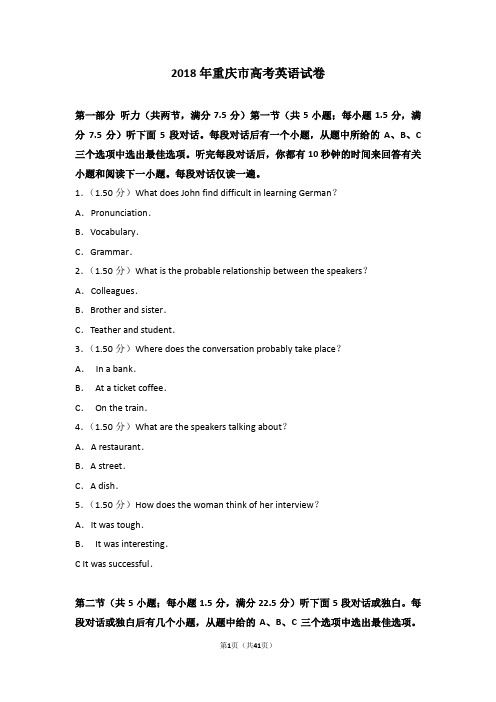
2018年重庆市高考英语试卷第一部分听力(共两节,满分7.5分)第一节(共5小题;每小题1.5分,满分7.5分)听下面5段对话。
每段对话后有一个小题,从题中所给的A、B、C 三个选项中选出最佳选项。
听完每段对话后,你都有10秒钟的时间来回答有关小题和阅读下一小题。
每段对话仅读一遍。
1.(1.50分)What does John find difficult in learning German?A.Pronunciation.B.Vocabulary.C.Grammar.2.(1.50分)What is the probable relationship between the speakers?A.Colleagues.B.Brother and sister.C.Teather and student.3.(1.50分)Where does the conversation probably take place?A.In a bank.B.At a ticket coffee.C.On the train.4.(1.50分)What are the speakers talking about?A.A restaurant.B.A street.C.A dish.5.(1.50分)How does the woman think of her interview?A.It was tough.B.It was interesting.C It was successful.第二节(共5小题;每小题1.5分,满分22.5分)听下面5段对话或独白。
每段对话或独白后有几个小题,从题中给的A、B、C三个选项中选出最佳选项。
听完每段对话或独白前,你将有时间阅读各个小题,每小题5秒钟;听完后,各小题将给出5秒钟的作答时间。
每段对话或独白读两遍。
6.(3.00分)听第6段材料,回答下列各题.(1)When will Judy go to a party?A.On Monday.B.On Tuesday.C.On Wednesday.(2)What will Max do next?A.Fly a kite.B.Read a magazine.C.Do his homework.7.(3.00分)听第7段材料,回答下列各题.(1)What does the man suggest doing at first?A.Going to a concert.B.Watching a movie.C.Playing a computer game.(2)What do the speakers decide to do?A.Visit Mike.B.Go boating.C.Talk a walk.8.(4.50分)听第8段材料,回答下列各题.(1)Which color do cats see better than humans?A.Red.B.Green.C.Blue.(2)Why do cats bring dead birds home?A.To eat them in a safe place.B.To show off their hunting skills.C.To make their owners happy.(3)How does the man sound at the end of the conversation?A.Grateful.B.Humorous.C.Curious.9.(6.00分)听第9段材料,回答下列各题.(1)Who is Macy?A.Ed's mother.B.Ed's teacher.C.Ed's friend.(2)How does Ed usually go to kindergarten?A.By car.B.On foot.C.By bus.(3)What does Ed enjoy doing at the kindergarten?A.Telling stories.B.Singing songs.C.Playing with others.(4)What do the teachers say about Ed?A.He's clever.B.He's quiet.C.He's brave.10.(6.00分)听第10段材料,回答下列各题.(1)At what age did Emily start learning ballet?A.Five.B.Six.C.Nine.(2)Why did Emily move to Toronto?A.To work for a dance school.B.To perform at a dance teacher.C.To learn contemporary dance.(3)Why did Emily quit dancing?A.She was too old to dance.B.She failed to get a scholarship.C.She lost interest in it.(4)How does Emily feel about stopping training?A.She's pleased.B.She's regretful.C.She's upset.第二部分阅读理解(共两节,满分30分)第一节(共4小题;每小题6分,满分30分)阅读下列短文,从每题所给的A、B、C和D四个选项中,选出最佳选项。
2018年重庆市高考英语试卷
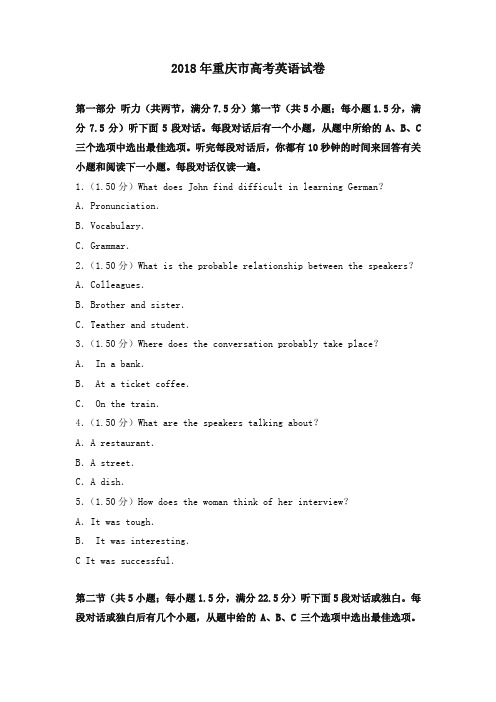
2018年重庆市高考英语试卷第一部分听力(共两节,满分7.5分)第一节(共5小题;每小题1.5分,满分7.5分)听下面5段对话。
每段对话后有一个小题,从题中所给的A、B、C 三个选项中选出最佳选项。
听完每段对话后,你都有10秒钟的时间来回答有关小题和阅读下一小题。
每段对话仅读一遍。
1.(1.50分)What does John find difficult in learning German?A.Pronunciation.B.Vocabulary.C.Grammar.2.(1.50分)What is the probable relationship between the speakers?A.Colleagues.B.Brother and sister.C.Teather and student.3.(1.50分)Where does the conversation probably take place?A. In a bank.B. At a ticket coffee.C. On the train.4.(1.50分)What are the speakers talking about?A.A restaurant.B.A street.C.A dish.5.(1.50分)How does the woman think of her interview?A.It was tough.B. It was interesting.C It was successful.第二节(共5小题;每小题1.5分,满分22.5分)听下面5段对话或独白。
每段对话或独白后有几个小题,从题中给的A、B、C三个选项中选出最佳选项。
听完每段对话或独白前,你将有时间阅读各个小题,每小题5秒钟;听完后,各小题将给出5秒钟的作答时间。
每段对话或独白读两遍。
6.(3.00分)听第6段材料,回答下列各题.(1)When will Judy go to a party?A.On Monday.B.On Tuesday.C.On Wednesday.(2)What will Max do next?A. Fly a kite.B. Read a magazine.C. Do his homework.7.(3.00分)听第7段材料,回答下列各题.(1)What does the man suggest doing at first?A. Going to a concert.B. Watching a movie.C. Playing a computer game.(2)What do the speakers decide to do?A.Visit Mike.B.Go boating.C.Talk a walk.8.(4.50分)听第8段材料,回答下列各题.(1)Which color do cats see better than humans?A.Red.B.Green.C.Blue.(2)Why do cats bring dead birds home?A. To eat them in a safe place.B. To show off their hunting skills.C. To make their owners happy.(3)How does the man sound at the end of the conversation?A. Grateful.B. Humorous.C. Curious.9.(6.00分)听第9段材料,回答下列各题.(1)Who is Macy?A. Ed's mother.B. Ed's teacher.C. Ed's friend.(2)How does Ed usually go to kindergarten?A. By car.B. On foot.C. By bus.(3)What does Ed enjoy doing at the kindergarten?A. Telling stories.B. Singing songs.C. Playing with others.(4)What do the teachers say about Ed?A. He's clever.B. He's quiet.C. He's brave.10.(6.00分)听第10段材料,回答下列各题.(1)At what age did Emily start learning ballet?A. Five.B. Six.C. Nine.(2)Why did Emily move to Toronto?A. To work for a dance school.B. To perform at a dance teacher.C. To learn contemporary dance.(3)Why did Emily quit dancing?A. She was too old to dance.B. She failed to get a scholarship.C. She lost interest in it.(4)How does Emily feel about stopping training?A. She's pleased.B. She's regretful.C. She's upset.第二部分阅读理解(共两节,满分30分)第一节(共4小题;每小题6分,满分30分)阅读下列短文,从每题所给的A、B、C和D四个选项中,选出最佳选项。
2018年重庆市高考英语试卷-最新版下载
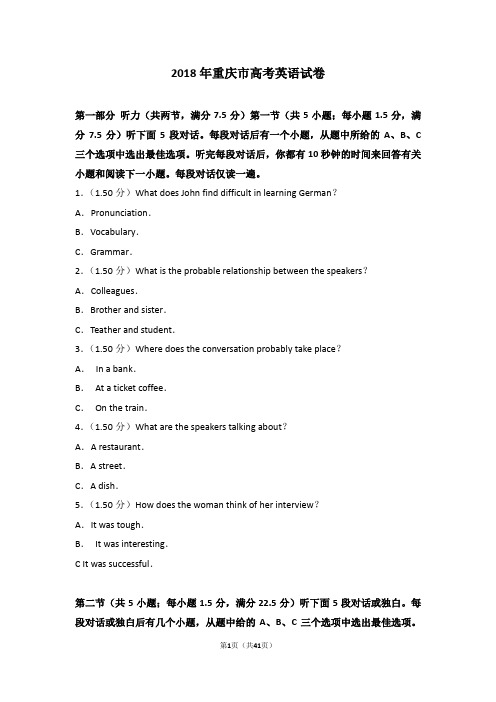
2018年重庆市高考英语试卷第一部分听力(共两节,满分7.5分)第一节(共5小题;每小题1.5分,满分7.5分)听下面5段对话。
每段对话后有一个小题,从题中所给的A、B、C 三个选项中选出最佳选项。
听完每段对话后,你都有10秒钟的时间来回答有关小题和阅读下一小题。
每段对话仅读一遍。
1.(1.50分)What does John find difficult in learning German?A.Pronunciation.B.Vocabulary.C.Grammar.2.(1.50分)What is the probable relationship between the speakers?A.Colleagues.B.Brother and sister.C.Teather and student.3.(1.50分)Where does the conversation probably take place?A.In a bank.B.At a ticket coffee.C.On the train.4.(1.50分)What are the speakers talking about?A.A restaurant.B.A street.C.A dish.5.(1.50分)How does the woman think of her interview?A.It was tough.B.It was interesting.C It was successful.第二节(共5小题;每小题1.5分,满分22.5分)听下面5段对话或独白。
每段对话或独白后有几个小题,从题中给的A、B、C三个选项中选出最佳选项。
听完每段对话或独白前,你将有时间阅读各个小题,每小题5秒钟;听完后,各小题将给出5秒钟的作答时间。
每段对话或独白读两遍。
6.(3.00分)听第6段材料,回答下列各题.(1)When will Judy go to a party?A.On Monday.B.On Tuesday.C.On Wednesday.(2)What will Max do next?A.Fly a kite.B.Read a magazine.C.Do his homework.7.(3.00分)听第7段材料,回答下列各题.(1)What does the man suggest doing at first?A.Going to a concert.B.Watching a movie.C.Playing a computer game.(2)What do the speakers decide to do?A.Visit Mike.B.Go boating.C.Talk a walk.8.(4.50分)听第8段材料,回答下列各题.(1)Which color do cats see better than humans?A.Red.B.Green.C.Blue.(2)Why do cats bring dead birds home?A.To eat them in a safe place.B.To show off their hunting skills.C.To make their owners happy.(3)How does the man sound at the end of the conversation?A.Grateful.B.Humorous.C.Curious.9.(6.00分)听第9段材料,回答下列各题.(1)Who is Macy?A.Ed's mother.B.Ed's teacher.C.Ed's friend.(2)How does Ed usually go to kindergarten?A.By car.B.On foot.C.By bus.(3)What does Ed enjoy doing at the kindergarten?A.Telling stories.B.Singing songs.C.Playing with others.(4)What do the teachers say about Ed?A.He's clever.B.He's quiet.C.He's brave.10.(6.00分)听第10段材料,回答下列各题.(1)At what age did Emily start learning ballet?A.Five.B.Six.C.Nine.(2)Why did Emily move to Toronto?A.To work for a dance school.B.To perform at a dance teacher.C.To learn contemporary dance.(3)Why did Emily quit dancing?A.She was too old to dance.B.She failed to get a scholarship.C.She lost interest in it.(4)How does Emily feel about stopping training?A.She's pleased.B.She's regretful.C.She's upset.第二部分阅读理解(共两节,满分30分)第一节(共4小题;每小题6分,满分30分)阅读下列短文,从每题所给的A、B、C和D四个选项中,选出最佳选项。
最新-2018年普通高等学校招生全国统一考试英语试题(重庆卷)解析版试题(2) 精品

2018年普通高等学校招生全国统一考试(重庆卷)英语试题卷英语试题卷共16页。
满分150分。
考试时间120分钟。
注意事项:1. 答题前,务必将自己的姓名、准考证号填写在答题卡规定的位置上。
2. 答选择题时,必须使用2B铅笔将答题卡上对应题目的答案标号涂黑。
如需改动用橡皮擦干净后,再选涂其他答案标号。
3. 答非选择题时,必须使用0.5毫米黑色签字笔,将答案写在答题卡规定的位置上。
4. 所有题目必须在答题卡上作答,在试题卷上答题无效。
5. 考试结束后,将试卷和答题卡一并交回。
一、听力(共三节,满分30分)做题时,请先将答案划在试题卷上。
录音内容结束后,你将有两分钟的时间将试题卷上的答案转涂或转填到答题卡上。
第一节(共5小题;每小题1.5分,满分7.5分)请听下面5段对话。
每段对话后有一个小题,从题中所给的A、B、C三个选项中选出最佳选项。
听完每段对话后,你都有10秒钟的时间来回答有关小题和阅读下一小题。
每段对话读一遍。
例:How much is the shirt?A. £19.15B. £9.15C. £9.18答案是B。
1.How old is the girl?A. 7B. 8C. 102 . Where does the conversation most probably take place ?A. In a bankB. In a storeC. In a library3. How will the two speakers travel ?A. By busB. By carC. By train4. What are the two speakers talking about ?A. Their workB. Their managerC. Their meeting5. What is the woman’s problem ?A. She is thirstyB. She is sickC. She is tired第二节(共12小题;每小题1.5分,满分18分)请听下面4端对话或独白。
2018年重庆市高考英语试卷
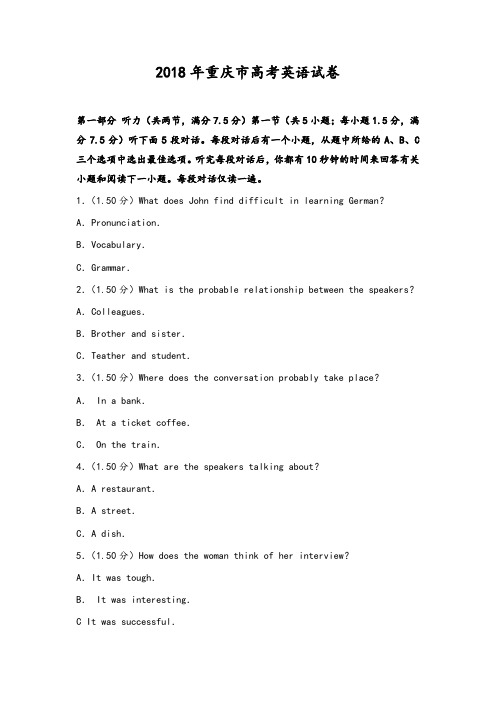
2018年重庆市高考英语试卷第一部分听力(共两节,满分7.5分)第一节(共5小题;每小题1.5分,满分7.5分)听下面5段对话。
每段对话后有一个小题,从题中所给的A、B、C 三个选项中选出最佳选项。
听完每段对话后,你都有10秒钟的时间来回答有关小题和阅读下一小题。
每段对话仅读一遍。
1.(1.50分)What does John find difficult in learning German?A.Pronunciation.B.Vocabulary.C.Grammar.2.(1.50分)What is the probable relationship between the speakers?A.Colleagues.B.Brother and sister.C.Teather and student.3.(1.50分)Where does the conversation probably take place?A. In a bank.B. At a ticket coffee.C. On the train.4.(1.50分)What are the speakers talking about?A.A restaurant.B.A street.C.A dish.5.(1.50分)How does the woman think of her interview?A.It was tough.B. It was interesting.C It was successful.第二节(共5小题;每小题1.5分,满分22.5分)听下面5段对话或独白。
每段对话或独白后有几个小题,从题中给的A、B、C三个选项中选出最佳选项。
听完每段对话或独白前,你将有时间阅读各个小题,每小题5秒钟;听完后,各小题将给出5秒钟的作答时间。
每段对话或独白读两遍。
6.(3.00分)听第6段材料,回答下列各题.(1)When will Judy go to a party?A.On Monday.B.On Tuesday.C.On Wednesday.(2)What will Max do next?A. Fly a kite.B. Read a magazine.C. Do his homework.7.(3.00分)听第7段材料,回答下列各题.(1)What does the man suggest doing at first?A. Going to a concert.B. Watching a movie.C. Playing a computer game.(2)What do the speakers decide to do?A.Visit Mike.B.Go boating.C.Talk a walk.8.(4.50分)听第8段材料,回答下列各题.(1)Which color do cats see better than humans?A.Red.B.Green.C.Blue.(2)Why do cats bring dead birds home?A. To eat them in a safe place.B. To show off their hunting skills.C. To make their owners happy.(3)How does the man sound at the end of the conversation?A. Grateful.B. Humorous.C. Curious.9.(6.00分)听第9段材料,回答下列各题.(1)Who is Macy?A. Ed's mother.B. Ed's teacher.C. Ed's friend.(2)How does Ed usually go to kindergarten?A. By car.B. On foot.C. By bus.(3)What does Ed enjoy doing at the kindergarten?A. Telling stories.B. Singing songs.C. Playing with others.(4)What do the teachers say about Ed?A. He's clever.B. He's quiet.C. He's brave.10.(6.00分)听第10段材料,回答下列各题.(1)At what age did Emily start learning ballet?A. Five.B. Six.C. Nine.(2)Why did Emily move to Toronto?A. To work for a dance school.B. To perform at a dance teacher.C. To learn contemporary dance.(3)Why did Emily quit dancing?A. She was too old to dance.B. She failed to get a scholarship.C. She lost interest in it.(4)How does Emily feel about stopping training?A. She's pleased.B. She's regretful.C. She's upset.第二部分阅读理解(共两节,满分30分)第一节(共4小题;每小题6分,满分30分)阅读下列短文,从每题所给的A、B、C和D四个选项中,选出最佳选项。
真题-2018年重庆市高考英语试卷
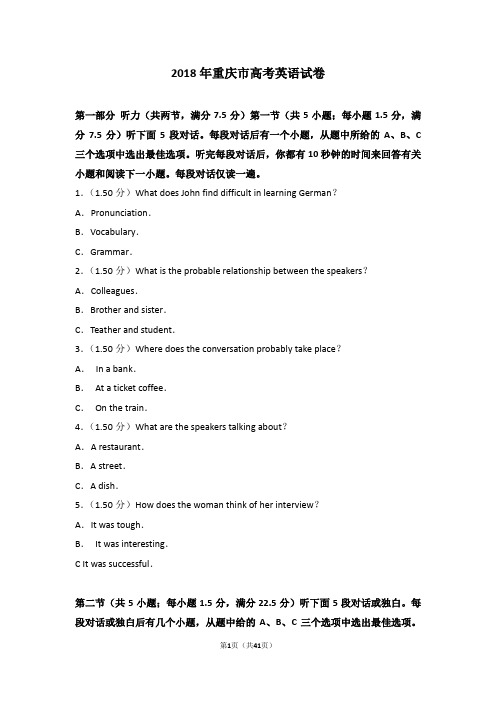
2018年重庆市高考英语试卷第一部分听力(共两节,满分7.5分)第一节(共5小题;每小题1.5分,满分7.5分)听下面5段对话。
每段对话后有一个小题,从题中所给的A、B、C 三个选项中选出最佳选项。
听完每段对话后,你都有10秒钟的时间来回答有关小题和阅读下一小题。
每段对话仅读一遍。
1.(1.50分)What does John find difficult in learning German?A.Pronunciation.B.Vocabulary.C.Grammar.2.(1.50分)What is the probable relationship between the speakers?A.Colleagues.B.Brother and sister.C.Teather and student.3.(1.50分)Where does the conversation probably take place?A.In a bank.B.At a ticket coffee.C.On the train.4.(1.50分)What are the speakers talking about?A.A restaurant.B.A street.C.A dish.5.(1.50分)How does the woman think of her interview?A.It was tough.B.It was interesting.C It was successful.第二节(共5小题;每小题1.5分,满分22.5分)听下面5段对话或独白。
每段对话或独白后有几个小题,从题中给的A、B、C三个选项中选出最佳选项。
听完每段对话或独白前,你将有时间阅读各个小题,每小题5秒钟;听完后,各小题将给出5秒钟的作答时间。
每段对话或独白读两遍。
6.(3.00分)听第6段材料,回答下列各题.(1)When will Judy go to a party?A.On Monday.B.On Tuesday.C.On Wednesday.(2)What will Max do next?A.Fly a kite.B.Read a magazine.C.Do his homework.7.(3.00分)听第7段材料,回答下列各题.(1)What does the man suggest doing at first?A.Going to a concert.B.Watching a movie.C.Playing a computer game.(2)What do the speakers decide to do?A.Visit Mike.B.Go boating.C.Talk a walk.8.(4.50分)听第8段材料,回答下列各题.(1)Which color do cats see better than humans?A.Red.B.Green.C.Blue.(2)Why do cats bring dead birds home?A.To eat them in a safe place.B.To show off their hunting skills.C.To make their owners happy.(3)How does the man sound at the end of the conversation?A.Grateful.B.Humorous.C.Curious.9.(6.00分)听第9段材料,回答下列各题.(1)Who is Macy?A.Ed's mother.B.Ed's teacher.C.Ed's friend.(2)How does Ed usually go to kindergarten?A.By car.B.On foot.C.By bus.(3)What does Ed enjoy doing at the kindergarten?A.Telling stories.B.Singing songs.C.Playing with others.(4)What do the teachers say about Ed?A.He's clever.B.He's quiet.C.He's brave.10.(6.00分)听第10段材料,回答下列各题.(1)At what age did Emily start learning ballet?A.Five.B.Six.C.Nine.(2)Why did Emily move to Toronto?A.To work for a dance school.B.To perform at a dance teacher.C.To learn contemporary dance.(3)Why did Emily quit dancing?A.She was too old to dance.B.She failed to get a scholarship.C.She lost interest in it.(4)How does Emily feel about stopping training?A.She's pleased.B.She's regretful.C.She's upset.第二部分阅读理解(共两节,满分30分)第一节(共4小题;每小题6分,满分30分)阅读下列短文,从每题所给的A、B、C和D四个选项中,选出最佳选项。
2018年全国高考英语试题及答案-重庆

2018年普通高等学校招生全国统一考试<重庆卷)英语试题卷英语试题卷共16页.满分150分,考试时间120分钟.注意事项:1.答题前,务必将自己地姓名、准考证号填写在答题卡规定地位置上.2.答选择题时,必须用2B铅笔把答题卡上对应题目地答案标号涂黑.如需改动,用橡皮擦干净后,再选涂其他答案地标号.3.答非选择题时,必须使用0.5毫M地黑色墨水签字笔,将答案书写在答题卡规定地位置上.4.所有题目必须在答题卡上作答,在试题卷上答题无效.5.考试结束后,将试题卷和答题卡一并交回.一、听力<共三节,满分30分)做题时,请先将答案划在试题卷上.录音内容结束后iu,你将有两分钟地时间将试卷上地答案转涂或转填到答题卡上.第一节<共5小题:每小题1.5分,满分7.5分)请听下面5段对话.每段对话后有一个小题,从题中所给出地A、B、C三个选项最佳选项.听完每段对话后,你都有10秒钟地时间来回答有关小题和阅读下一小题.每段对话读一遍.例:How much is the shirt?A. £19.15B. £9.15C. £9.18答案是B.1.Who is the woman?A. MaryB. Mary’s sisterC. Mary’s friend2.How much are the polatoes?A.6 cents a pound.B. 16cents a pound.C. 60 cents a pound.3.Where does the conversation most probably take place?A.In a restaurant.B. On a farm.C.At home.4.What does the woman ask the man to do ?A.Have his hair cut.B.Go to the library.C.Buy some food.5.What is the conversation mainly about?A.Vacation planB.Summer tripC.Part-time job第二节<共12小题;每小题1.5分你,满分18分)请听下面4段对话或独白.每段对话或独白后有几个小题,从题中所给地A、B、C三个选项中选出最佳选项.听每段对话或独白前,你将有时间阅读各小题,每小题5秒钟;听完后,各小题将给出5秒钟地作答时间.每段对话或独白读两遍.6.Why did the woman go to a small town ?A. To meet a neighborB. To visit her friendsC. To go horse-riding7. What did the woman do on Saturday?A. She went to a partyB. She went to a farmC. She went to a concert8. What are the two speakers mainly talking about?A. An interesting party.B. A beautiful farm.C. A wonderful weekend.请听第7段材料,回答第9至11题.9. What are the two speakers mainly talking about?A. The course of painting.B. The meaning of a painting.C. The color of a painting.10. How does the man know much about painting?A. He has taken painting courses.B. He has worked for an artist.C. He has learned it from his father.11. What does the man invite the woman to do?A. Meet his father.B. Have a cup of coffee.C. Go to an exhibition.请听第8段材料,回答第12至14题.12. Why does the man call the woman?A. To tell her about his doctor’s advice.B. To discuss his health plan with her.C. To ask for information about a health club.13. What does the woman usually do in the club?A. Dancing.B. Playing tennis.C. Swimming.14. Where are the two speakers going to meet tonight?A. In front of a health club.B. In front of the woman’s house.C. In front of a hospital.请听第9段材料,回答第15至17题.15. What was Einstein’s first job in Switzerland?A.Teaching in a school.B.Working for the government.C.Doing research in a job.16.When did Einstein move to the United States?A.In 1905.B.In 1933.C.In 1955.17.What is the talk mainly about?A.Einstein ’s life experienceB.Einste in’s scienfic researchC.Einstein’s musical ability第三节<共3小题;每小题1.5分,满分4.5分)请听下面一段独白,用所听到地独白中地词或数填空,每空限填一个词或一个数.填入地内容要卸载答题卡相应地位置上,在听本段独白前,你将有时间阅读各小题,每小题5秒钟;听完后,各小题将给出5秒钟地作答时间.本段独白读两遍.请听第10段材料,回答第18至20题.二、英语知识运用<共两节,满分45分)第一节单项填空<共15小题:每小题1分,满分15分)请从A、B、C四个选项中,选出可以填入空白处地最佳选项,并在答题卡上将该选项标号涂黑.例:A computer can only do__________ you have instructed it to do.A. howB. afterC. whatD. when答案是:C21. That price of music sounds quite familiar. Who _________the piano upstairs?A. has playedB. playedC. playsD. is playing22. It is still under discussion __________the old bus station should be replaced with a modern hotel or not.A. WhetherB. whenC. whichD. where23.——Are you going to take part in the speech contest?———_____________It’s too good an opportunity to miss.A. No problem!B. That’s for sure.C. Why me?D. Why bother?24.Shirley, a real book lover, often brings home many books to read __________ the library.A. inB. forC. byD. from25.——Why didn’t you come to Simon’s party last night?—— I want to ,but my mom simply _________ not let me out so late at night.A. couldB. mightC. wouldD. should26. In communication, a smile is usually ___________ strong sign of a friendly and _______ open attitude.A. the, /B. a, anC. a, /D. the, an27.——Silly me! I foeget what my luggage looks like.——What do you think of over there?A.the oneB.thisC.itD.that28.I told them not everybody could run as fast as you did, ?A.could heB.didn’t IC. didn’t youD. could they29.MoreTV programs,according to government to officials,will be producedpeople’s concern over food safety.A.to raiseB.raisingC.to have raisedD. having raised30.To show our respect, we usually have to take our gloves off we are to shake hands with.A.whicheverB.wheneverC.whoeverD.wherever31.Look at the pride on Tom’s face. He to have been praised by the manager just now.A.seemedB.seemsC.had seemedD.is seeming32.—Have you seem the film Under the Hawthorn Tree?— Of course, I hava. It was in our village it was made.A.thatB.whereC.whenD.which33. Michael put up a picture of Yao Ming beside the bed to keep himself ________ of his own dreams.A. remindingB. to remindC. remindedD. renmind34. It is not always easy for the public to see _______ use a new invention can be of to human life.A. whoseB. whatC. whichD. that35. ---Do you have Mary’s phone number?---Sorry,____________.A. I don't knowB. forget itC. here you areD. I can’t remember it第二节完形填空<共20小题;每小题1.5分,满分30分)请阅读下面短文,掌握其大意,然后从36~55各题所给地四个选项<A、B、C和D)中,选出最佳选项,并在答题卡上将该选项地标号涂黑.My father brought home a sailboat when I was ten, and almost each Sunday in summers we would go sailing. Dad was quite skilled in sailing, but not good at 36 . As for me, I 37 both before twelve because of living close to Lake Ontario.The last time Dad and I set sail together is really 38 . It was a perfect weekend after I graduated from university. I came home and 39 Dad to go sailing. Out we set soon on the 40 lake. Dad hadn’t sailed for years, but everything 41 well with the tiller<舵柄)in his hands.When we were in the middle of the lake, a 42 wind came all of a sudden. The boat was hit 43 . Dad was always at his best in any 44 , but at this moment he 45 .“John! 46 !” he shouted in a trembling voice, with the tiller still in his hands.In my memory he could fix any 47 . He was the one I always 48 for strength and security. Before I could respond, a 49 of water got into the boat. I rushed to the tiller 50 it was too late. Anther huge wall of water 51 the boat in a minute. We were thrown into the water, and Dad was struggling aimlessly. At that moment, I felt fiercely 52 of him.I swam to Dad 53 and assisted him in climbing onto the hull<船壳)of the boat. Upon sitting on the hull, Dad was a little awkward about his flash of 54 . “It’s all right, Dad. We are safe now,” I comforted him.That was the first time Dad had counted on me in a moment of emergency. More importantly, I found it was my turn to start 55 for my father.36.A.boating B. running C. swimming D. teaching37.A.enjoyed B. desired C. hated D. learned38.A.unforgivable B. unforgettable C. cheerful D. regretful39.A.sent B. ordered C. invited D. allowed40.A.calm B. icy C. stormy D. thundery41.A.finished B. went C. seemed D. sounded42.A.strong B. gentle C. cold D. hot43.A.respeatedly B. lightly C. hardly D. violently44. A. danger B. place C. sport D. job45. A. suffered B. fell C. froze D. withdrew46. A. look B. Help C. Run D. Jump47. A. problem B. relationship C. machine D. boat48. A. turned to B. lived with C. argued with D. objected to49. A. fountain B. stream C. shower D. wave50. A. if B. for C. after D. but51. A. got through B. poured into C. turned over D. lifted up52. A. ashamed B. protective C. tired D. afraid53. A. hopelessly B. quickly C. slowly D. helplessly54. A. pain B. anger C. fear D. shame55. A. making up B. getting ready C. paying off D. looking out三、阅读理解<共20小题;每小题2分,满分40分)请阅读下列短文,从每题所给地四个选项<A、B、C和D)中,选出最佳选项,并在答题卡上将该选项地标号涂黑.AThere was a gardener who looked after his garden with great care .To water his flowers, he used two buckers .One was a shiny and new bucket. The other was a very old and dilapidated one. Which had seen many years of service, but was now past its best.Every morning, the gardener would fill up the two buckets. Then he would carry them along the path, one on each side, to the flowerbeds. The new bucket was very proud of itself. It could carry a full bucket of water without a single drop spilled (溢出>. The old bucket felt very ashamed because of its holes: before it reached the flowerbeds, much water had leaked along the path.Sometimes the new bucket would say,“ See how capable I am ! How good it is that the gardener has me to water the flowers every day ! I don't know why he still bothers with you. What a waste of apace you are!”And all that t he old bucket could say was. “ I know I am not very useful, but I can only do my best .I am happy that the gardener still finds a little bit of use in me ,at least .”One day, the gardener heard that kind or conversation .After was ring the flowers as usua l .he said ,”You both have done your work very well .Now I am going to carry you back .I want you to look carefully along the path.”Then the two buckets did so.All along the path,they noticed,on the side where the new bucket was carried.there was just bare<光秃秃地)earth;one the onther side where the old bucket was carried.there was a joyous row of wild flowers,leading all the way to the garden.56.What does the underlined word“dilapidated”probably mean?A.DirtyB.DarkC.Worn-outD.Plain-looking.57.What was the old bucket ashamed of?A.His past.B.His aging.C.His manner.D.His leaking.58.The new bucket made conversations with the old one mainly tougth at the old oneB.take pity on the old oneC.show off its beautiful looksD.praise the gardener’s kindne ss59.Why was the old bucket still kept by the gardener?A.Because it was used to keep a balanceB.Because it stayed in its besr conditionC.Because it was taken as a treasureD.Because it had its own functionBMapping Your WorldDifferent forms of maps are appearing.They allow independent travelers to get local knowledge of places they are visting,from the official to the unusual.Meanwhile,hi-tech developments are ereating new ways for us to map the world.Here are two of our favorites;Green MapsGreen Maps allows people to share with the world their knowledge of environmentally friendly plaees and autactetions in the local areas. Users add information with a set of icons<图标),making It easy to read any map ,whatever the nationalities of those who produce it . At present there are over five hundredMap projects being developed in 54 countries Green Maps’ advertised idea is “think global,map local” .It is a wonderful way of gaining all sorts of a place ,ranning fromcommunity garden to good places of bird watching.Green Maps is not specifically intended for travelers. Not all of its maps are online, so it may be necessary for some users to communicate with producers through the Green Maps website.Maps MashupsMany people use online maps developed by Google, but not many know about the mashups of them. Working in a similar way to Green Maps, Maps Mashups allows people to add icons of their own to exsiting maps to express a certain topic. The mashups is so called because it combine all the knowledge you could ever need. It ranges from the extremely useful, such as where all the World. Heritage Site are, to the most bizarre <古怪地),such as where America’s munkest cities are.With the mashups added to the basic Google Maps, a multi-layered (多层地> map can be created.60.According to the passage,which of the following is a characteristic of Green Maps?A.Aiming at environmental protection.B.Introducing local attractions with icons.C.Offering advice to independent travelers.D.Cllecting icons worldwide for local maps.61.Which of the following icons is most probably NOT used in Green Maps?A. B.C. D.62. Map Mashups is named with the word “mashups”becauseA.it is produced by users all over the worldB.it gathers various kinds of informationC.it shaers icons with Green MapsD.it is a branch of Google Maps63.What do Green Maps and Map Mashups have in common?A. They are created by local people.B. They are environmentally friendly.C. Users can edit maps on the Inernet.D. Users need to communicate with produces.CGetting rid of dirt, in the opinion of most people, is a good thing. However, there is nothing fixed about attitudes to dirt.In the early 16th century, people thought that dirt on the skin was a means to block out disease, as medical opinion had it that washing off dirt with hot water could open up the skin and let ills in. A particular danger was thought to lie in public baths. By 1538, the French king had closed the bath houses in his kingdom. So did the king of England in 1546. Thus began a long time when the rich and the poor in Europe lived with dirt in a friendly way. Henry IV, King of France, was famously dirty. Upon learning that a nobleman had taken a bath, the king ordered that, to avoid the attack of disease, the nobleman should not go out.Though the belief in the merit of dirt was long-lived, dirt has no longer been regarded as a nice neighbor ever since the 18th century. Scientifically speaking, cleaning away dirt is good to health. Clean water supply and hand washing are practical means of preventing disease. Yet, it seems that standards of cleanliness have moved beyond science since World War Ⅱ. Advertisements repeatedly sell the idea; clothes need to be whiter than white, cloths ever softer, surfaces to shine. Has the hate for dirt, however, gone too far?Attrtedes to dirt still differ hugely nowadays.Many first-time parents nervously try to warn their children off touching dirt, which might be responsible for the spread of disease.On the conterary,Mary Ruebush,an American immunologist(免疫学家>,encourages children to play in the dirt to build up a strong immune system.And the latter position is gaining some ground.64.The kings of France and England in the 16th century closed bath houses because.A.they lived healthily in a dirty environment.B they thought bath houses were to dirty to stay inC. they believed disease could be spread in public bathsD. they considered bathing as the cause of skin disease65.Which of the following best describes H enry IV’s attitude to bathing?A.AfraidB.CuriousC.ApprovingD.Uninterested66. How does the passage mainly develop?A. By providing examples.B. By making comparisons.C. By following the order of time.D. By following the order of importance.67.What is the author’s purpose in writing the passage?A. To stress the role of dirt.B. To introduce the history of dirt.C. To call attention to the danger of dirt.D. To present the change of views on dirt.DWilliam Butler Yeats, a most famous Irish writer, was born in Dublin on June 13,1865. His childhood lacked the harmony (和睦> that was typical of a happy family. Later, Yeats shocked his family by saying that he remembered “little of childhood but its pain”. In fact, he inherited (继承> excellent taste in art from his family ——both his father and his brother were painters. But he finally settled on literature , particularly drama (戏剧> and poetry.Yeats had strong faith in coming of new artistic movements. He set himself the fresh task in founding an Irish national theatre in the late 1890s.His early theatrical experiments,however,were not received favorably at the beginning. He didn’t lose heart,and finally enjoyed success in his poetical drama.Compared with his dramatic works, Yeats’s poems attract much admiring notice.The subject matter includes love,nature,history,timeand aging. Though Yeats generally relied on very tradisional forms, he brought modern sensibility to them. As his literary life progressed, his poetry grew finer and richer, which led him to worldwide recognition.He had not enjoyed a major public life since winning the Nobel Price in 1923.Yet,he continued writing almost to the end of his life. Had Yeats stopped writing at age 40,he would probably now his valued as a manor poet, for there is no other example in literaryhistory of a poet who produces his greatest works between the ages of 50 and 75. After Yeats’s death in 1939, W.H. Auden wrote, among others, the following lines: Earth,recive an honoured guest:William Yeats is laid to rest.Let the Irish vessel (船> lieEmptied of its poetry68.Which of the following can describe Yeats’s family?A.It filled Yeats’s childhood with laughter.B.It was shocked by Yeats’s choice.C.It was a typically wealthy family.D.It had an artistic atmosphere.69.Ac cording to thse passage,what do we know about Yeats’s life?A.Yeats founded the first Irish theater.B.Yeats stuck to modern forms in his peotry.C.Yeats began to produce his best works from the 1910s.D.Yeats was not favored by the publie until the 1923 Noble Prize.70.What kind of feeling is expressed in W.H.Auden’s lines?A.EnvyB.SympathyC.EmptinessD.Admiration71.What is the passage mainly about?A.Yeats’s literary achievementsB. Yeats’s historical infuluenceC. Yeats’s artistic ambitionD. Yeats’s national honorESkeptics are stange lot.Some of them refuse to admit the serious threat of human activities to the enviroment, and they are tired of people who disagree with them.Those people,say skeptics,spread noting but bad news about the environment.T he “eco-guilt”brought on by the discouraging nes about our planet gives rise to the popularity od skeptice as people search for more comforting worldviews.Perhaps that explains why a new book by Bjorn Lomborg received so much publicity.That book ,The Skeptical Environmentalist, declares that it measures the “real state of the world”as fine. Of course ,another explanation is the deep pockets of some big businesses with special intererts. Indeed, Mr. Lomborg’s views are similar to those of some Industry-funded organizations, which start huge activities though the media to confuse the public aboat issues like global warming.So it was strange to see Mr. Lomborg’s book go largely unchallenged in the media though his beliefs were contrary to most scientific opinions. One national newspaper in Canada ran a number of articles and reviews full of words of praise, even with the conclusion that “After Lomborg, the environmental movement will begin to die down.”Such one-sided views should have immediately been challenged. But only a different review appeared in Nature, a respected science magazine with specific readership. The review remarked that Mr. Lomborg’s “preference for unexamined materials is incredible<不可信地)”.A critical <批判地)eye is valuable, and the media should present information in such a way that could allow people to make informed decisions. Unfortunately, that is often inaccessible as blocked by the desire to be shocking or to defend some special interest. People might become half-blind before a world partially exhibited by the media. That’s a shame, because matters concerning the health of the planet are far too important to be treated lightly.72. According to the passage, which of the following may be regarded as “skeptics”?A. People who agree on t he popularity of “eco-guilt”.B. People who disbelieve the serious situation of our planet.C. People who dislike the harmful effect of human activities.D. People who spread comforting news to protect our environment.73. Which of the following can be a r eason for the popularity of Lomborg’s books?A. Some big businesses intend to protect their own interests.B .The book challenges views about the fine state of the wirld.C. The author convinces people to speak comforting worldviews.D. Industry–funded media present confusing information.74. The author mentioned the review in Nature in order to____.A. voice a different opinionB. find fault with Lomborg’s bookC. challenge the authority of the mediaD. point out the value of scientific views.75. What is the author’s main purpose in writing the passenger?A. To encourage the skeptics to have a critical eye.B. To warn the public of the danger of half–blindness with reviews.C. To blame the media’s lack of responsibility in information.D. To show the importance of presenting overall information by the media.四、写作<共两节,满分35分)第一节短文改错<共10小题;每小题1份,满分10分)以下标有题号地每一行均有一个错误,请找出,并按下列情况改正:此行多一个词:把多余地词用斜线<\)划掉,在该行右边横线上写出该词,并也用斜线划掉.此行缺一个词:在缺词处加一个漏字符号<∧),在该行右边横线上写出该加地词.此行错一个词:在错地词下划一横线,在该行右边横线上写出改正后地词.注意:请在答题卡上作答.Today is Sunday .I′ve been in Canada for two months .This is the first time that I′ve been away my family for such a 76.long time. With the help of Katia,a roommate of me, I′ve 77.soon got used to live without my parents around. Katia,like 78.many other Russian girls, are nice and lively. We became 79.friends shortly after we meet each other. Although her English 80.is a little hardly to understand, we enjoy chatting and we 81.usually talk a lo t about our own family. We’re both surprised 82.that Chinese culture or Russian culture are so different. Now, 83.we are planning a small party for the next Sunday.There ,Katia 84.will introduce me to some of her friends,one of who has been 85.to China several times.I just can’t wait.第二节书面表达<满分25分)某国际动物关爱协会面向全球中学生招募“动物代言人”,希望申请者选择一种自己喜欢地动物,为之代言<speak for).假设你是重庆新华中学地学生李华,有意参与该活动.现请您用英文在线填写申请表<仅需填写“申请陈述”部分............),内容如下:●表示有意参加●说明自己富有爱心、关爱动物●打算为何种动物代言,并说明理由●希望申请成功Application Form <申请表)注意:<1)请在答题卡规定区域内作答;<2)词数100左右;<3)“申请陈述”地第一句已经给出,不计入总词数.2018年普通高等学校招生全国统一考试<重庆卷)英语试题答案一、听力<共20小题,每小题1.5分,满分30分)1.B2.B3.A4.C5.A6.B7.A8.C9.C 10.C 11.B 12.C 13.C 14.B 15.A16.B 17.A18.spring/Spring 19.20/twenty/Twenty 20.picnic/Picnic二、英语知识运用<共两节,满分45分)第一节单项填空<共15小题;每小题1分,满分15分)21-25 DABDC 26-30 CDBAC 31-35 BACBD第二节完形填空<共20小题;每小题1.5分,满分30分)36-40 CDBCA 41-45 BADAC 46-50 BAADD 51-55 CBBCD二、阅读理解<共20小题;每小题2分,满分40分)56-60 CDADB 61-65 BBCCA 66-70 CDDCD71-75 ABAAD四、写作<共两节,满分35分)第一节短文改错<共10小题;每小题1分,满分10分)Today is Sunday .I′ve been in Canada for two months .This is the first time that I′ve been away^ my family for such a 76.from long time. With the help of Katia,a roommate of me, I′ve 77.mine soon got used to live without my parents around. Katia,like 78.living many other Russian girls, are nice and lively. We became 79. isfriends shortly after we meet each other. Although her English 80.metis a little hardly to understand, we enjoy chatting and we 81.hard usually talk a lot about our own family. We’re both surprised 82.families that Chinese culture or Russian culture are so different. Now, 83.andwe are planning a small party for the next Sunday.There ,Katia 84.thewill introduce me to some of her friends,one of who has been 85.whomto China several times.I just can’t wait.第二节书面表达<满分25分)略申明:所有资料为本人收集整理,仅限个人学习使用,勿做商业用途.。
2018年重庆市高考英语试卷-新编审

2018年重庆市高考英语试卷第一部分听力(共两节,满分7.5分)第一节(共5小题;每小题1.5分,满分7.5分)听下面5段对话。
每段对话后有一个小题,从题中所给的A、B、C 三个选项中选出最佳选项。
听完每段对话后,你都有10秒钟的时间来回答有关小题和阅读下一小题。
每段对话仅读一遍。
1.(1.50分)What does John find difficult in learning German?A.Pronunciation.B.Vocabulary.C.Grammar.2.(1.50分)What is the probable relationship between the speakers?A.Colleagues.B.Brother and sister.C.Teather and student.3.(1.50分)Where does the conversation probably take place?A.In a bank.B.At a ticket coffee.C.On the train.4.(1.50分)What are the speakers talking about?A.A restaurant.B.A street.C.A dish.5.(1.50分)How does the woman think of her interview?A.It was tough.B.It was interesting.C It was successful.第二节(共5小题;每小题1.5分,满分22.5分)听下面5段对话或独白。
每段对话或独白后有几个小题,从题中给的A、B、C三个选项中选出最佳选项。
听完每段对话或独白前,你将有时间阅读各个小题,每小题5秒钟;听完后,各小题将给出5秒钟的作答时间。
每段对话或独白读两遍。
6.(3.00分)听第6段材料,回答下列各题.(1)When will Judy go to a party?A.On Monday.B.On Tuesday.C.On Wednesday.(2)What will Max do next?A.Fly a kite.B.Read a magazine.C.Do his homework.7.(3.00分)听第7段材料,回答下列各题.(1)What does the man suggest doing at first?A.Going to a concert.B.Watching a movie.C.Playing a computer game.(2)What do the speakers decide to do?A.Visit Mike.B.Go boating.C.Talk a walk.8.(4.50分)听第8段材料,回答下列各题.(1)Which color do cats see better than humans?A.Red.B.Green.C.Blue.(2)Why do cats bring dead birds home?A.To eat them in a safe place.B.To show off their hunting skills.C.To make their owners happy.(3)How does the man sound at the end of the conversation?A.Grateful.B.Humorous.C.Curious.9.(6.00分)听第9段材料,回答下列各题.(1)Who is Macy?A.Ed's mother.B.Ed's teacher.C.Ed's friend.(2)How does Ed usually go to kindergarten?A.By car.B.On foot.C.By bus.(3)What does Ed enjoy doing at the kindergarten?A.Telling stories.B.Singing songs.C.Playing with others.(4)What do the teachers say about Ed?A.He's clever.B.He's quiet.C.He's brave.10.(6.00分)听第10段材料,回答下列各题.(1)At what age did Emily start learning ballet?A.Five.B.Six.C.Nine.(2)Why did Emily move to Toronto?A.To work for a dance school.B.To perform at a dance teacher.C.To learn contemporary dance.(3)Why did Emily quit dancing?A.She was too old to dance.B.She failed to get a scholarship.C.She lost interest in it.(4)How does Emily feel about stopping training?A.She's pleased.B.She's regretful.C.She's upset.第二部分阅读理解(共两节,满分30分)第一节(共4小题;每小题6分,满分30分)阅读下列短文,从每题所给的A、B、C和D四个选项中,选出最佳选项。
2018年重庆市高考英语试卷【精编】

2018年重庆市高考英语试卷第一部分听力(共两节,满分7.5分)第一节(共5小题;每小题1.5分,满分7.5分)听下面5段对话。
每段对话后有一个小题,从题中所给的A、B、C 三个选项中选出最佳选项。
听完每段对话后,你都有10秒钟的时间来回答有关小题和阅读下一小题。
每段对话仅读一遍。
1.(1.50分)What does John find difficult in learning German?A.Pronunciation.B.Vocabulary.C.Grammar.2.(1.50分)What is the probable relationship between the speakers?A.Colleagues.B.Brother and sister.C.Teather and student.3.(1.50分)Where does the conversation probably take place?A.In a bank.B.At a ticket coffee.C.On the train.4.(1.50分)What are the speakers talking about?A.A restaurant.B.A street.C.A dish.5.(1.50分)How does the woman think of her interview?A.It was tough.B.It was interesting.C It was successful.第二节(共5小题;每小题1.5分,满分22.5分)听下面5段对话或独白。
每段对话或独白后有几个小题,从题中给的A、B、C三个选项中选出最佳选项。
听完每段对话或独白前,你将有时间阅读各个小题,每小题5秒钟;听完后,各小题将给出5秒钟的作答时间。
每段对话或独白读两遍。
6.(3.00分)听第6段材料,回答下列各题.(1)When will Judy go to a party?A.On Monday.B.On Tuesday.C.On Wednesday.(2)What will Max do next?A.Fly a kite.B.Read a magazine.C.Do his homework.7.(3.00分)听第7段材料,回答下列各题.(1)What does the man suggest doing at first?A.Going to a concert.B.Watching a movie.C.Playing a computer game.(2)What do the speakers decide to do?A.Visit Mike.B.Go boating.C.Talk a walk.8.(4.50分)听第8段材料,回答下列各题.(1)Which color do cats see better than humans?A.Red.B.Green.C.Blue.(2)Why do cats bring dead birds home?A.To eat them in a safe place.B.To show off their hunting skills.C.To make their owners happy.(3)How does the man sound at the end of the conversation?A.Grateful.B.Humorous.C.Curious.9.(6.00分)听第9段材料,回答下列各题.(1)Who is Macy?A.Ed's mother.B.Ed's teacher.C.Ed's friend.(2)How does Ed usually go to kindergarten?A.By car.B.On foot.C.By bus.(3)What does Ed enjoy doing at the kindergarten?A.Telling stories.B.Singing songs.C.Playing with others.(4)What do the teachers say about Ed?A.He's clever.B.He's quiet.C.He's brave.10.(6.00分)听第10段材料,回答下列各题.(1)At what age did Emily start learning ballet?A.Five.B.Six.C.Nine.(2)Why did Emily move to Toronto?A.To work for a dance school.B.To perform at a dance teacher.C.To learn contemporary dance.(3)Why did Emily quit dancing?A.She was too old to dance.B.She failed to get a scholarship.C.She lost interest in it.(4)How does Emily feel about stopping training?A.She's pleased.B.She's regretful.C.She's upset.第二部分阅读理解(共两节,满分30分)第一节(共4小题;每小题6分,满分30分)阅读下列短文,从每题所给的A、B、C和D四个选项中,选出最佳选项。
【高三英语试题精选】2018年重庆高考英语试题含答案(word版)

23______to work overtime that evening,I missed a wonderful film
AHaving been asked BTo ask CHaving asked DTo be asked
24Sam has been appointed _______ manager of the engineering department to take ____ p;ace of George
Ahave run out Bare running out
Chave been run out Dare being run out
28We’re having a meeting in half an hourThe decision______at the meeting will inf the future of our pany
Aconsider Bconsidering
Cto consider Dconsidered
32It was 80 years before Christopher Columbus crossed the Atlantic______Zheng sailed to East Africa
Awhen Bthat
64The story of Queen Victoria is to shothat _____
Athe queen is rich in tour experience
Bthe Castle is a good place to go in Scotland
Ctasting whisky is better than going fishing
重庆高考英语真题附答案

重庆高考英语真题附答案部门: xxx时间: xxx整理范文,仅供参考,可下载自行编辑2018年普通高等学校招生全国统一考试(重庆卷>英语试卷卷英语试卷卷共10页。
满分120分。
考试时间l00分钟。
注意事项:I.答题前,务必将自己的姓名、准考证号填写在答题卡规定的位置上。
2.答选择题时,必须使用2B铅笔将答题卡上对应题目的答案标号涂黑。
如需改动,用橡皮擦擦干净后,再迭涂其它答案标号。
3.答非选择题时,必须使用0.5毫M黑色签字笔,将答案书写在答题卡规定的位置上。
4.所有题目必须在答题卡上作答,在试卷卷上答题无效。
5.考试结束后,将试卷卷和答题卡一并交回。
一、单项埴空(共L‘小题;每小题1分,满分15分>请从A、B、c、D四个选项中,选出可以填人空白处的最佳选项,井在答属卡上将该选项的标号涂黑。
例:A computer can only do __ you have instructed it to do.b5E2RGbCAPA. howB. afterC. whatD. whenp1EanqFDPw答案是 C。
I. A smile costs ____ .but gives much.A. anythingB. somethingDXDiTa9E3dC. nothingD. everything2. -- Why not stay here a little longer?-- ____. but I really have to go.A. Never mindB. I'd love toC. Pleased to meet youD. I can't find any zxxk reasonRTCrpUDGiT3. I've ordered some pizza, so we ____ worry about cooking when we get home tired.5PCzVD7HxAA. can'tB. dare notjLBHrnAILgC, needn't D. may not4. You'd better write down her phone number before you ____ it.xHAQX74J0XA. forgetB. are forgettingc. forgot D. will forget5. The producer comes regularly to collect the cameras_____ to our shop for quality problems.LDAYtRyKfEA. returningB. returnedZzz6ZB2LtkC. to returnD. to be returneddvzfvkwMI16. I can't tell you __ way to the Wilson's because we don't have ___ Wilson here in the village.rqyn14ZNXIA. the。
【推荐】2018年重庆市高考英语试卷

2018年重庆市高考英语试卷第一部分听力(共两节,满分7.5分)第一节(共5小题;每小题1.5分,满分7.5分)听下面5段对话。
每段对话后有一个小题,从题中所给的A、B、C 三个选项中选出最佳选项。
听完每段对话后,你都有10秒钟的时间来回答有关小题和阅读下一小题。
每段对话仅读一遍。
1.(1.50分)What does John find difficult in learning German?A.Pronunciation.B.Vocabulary.C.Grammar.2.(1.50分)What is the probable relationship between the speakers?A.Colleagues.B.Brother and sister.C.Teather and student.3.(1.50分)Where does the conversation probably take place?A.In a bank.B.At a ticket coffee.C.On the train.4.(1.50分)What are the speakers talking about?A.A restaurant.B.A street.C.A dish.5.(1.50分)How does the woman think of her interview?A.It was tough.B.It was interesting.C It was successful.第二节(共5小题;每小题1.5分,满分22.5分)听下面5段对话或独白。
每段对话或独白后有几个小题,从题中给的A、B、C三个选项中选出最佳选项。
听完每段对话或独白前,你将有时间阅读各个小题,每小题5秒钟;听完后,各小题将给出5秒钟的作答时间。
每段对话或独白读两遍。
6.(3.00分)听第6段材料,回答下列各题.(1)When will Judy go to a party?A.On Monday.B.On Tuesday.C.On Wednesday.(2)What will Max do next?A.Fly a kite.B.Read a magazine.C.Do his homework.7.(3.00分)听第7段材料,回答下列各题.(1)What does the man suggest doing at first?A.Going to a concert.B.Watching a movie.C.Playing a computer game.(2)What do the speakers decide to do?A.Visit Mike.B.Go boating.C.Talk a walk.8.(4.50分)听第8段材料,回答下列各题.(1)Which color do cats see better than humans?A.Red.B.Green.C.Blue.(2)Why do cats bring dead birds home?A.To eat them in a safe place.B.To show off their hunting skills.C.To make their owners happy.(3)How does the man sound at the end of the conversation?A.Grateful.B.Humorous.C.Curious.9.(6.00分)听第9段材料,回答下列各题.(1)Who is Macy?A.Ed's mother.B.Ed's teacher.C.Ed's friend.(2)How does Ed usually go to kindergarten?A.By car.B.On foot.C.By bus.(3)What does Ed enjoy doing at the kindergarten?A.Telling stories.B.Singing songs.C.Playing with others.(4)What do the teachers say about Ed?A.He's clever.B.He's quiet.C.He's brave.10.(6.00分)听第10段材料,回答下列各题.(1)At what age did Emily start learning ballet?A.Five.B.Six.C.Nine.(2)Why did Emily move to Toronto?A.To work for a dance school.B.To perform at a dance teacher.C.To learn contemporary dance.(3)Why did Emily quit dancing?A.She was too old to dance.B.She failed to get a scholarship.C.She lost interest in it.(4)How does Emily feel about stopping training?A.She's pleased.B.She's regretful.C.She's upset.第二部分阅读理解(共两节,满分30分)第一节(共4小题;每小题6分,满分30分)阅读下列短文,从每题所给的A、B、C和D四个选项中,选出最佳选项。
2018年重庆市高考英语试卷-精品下载
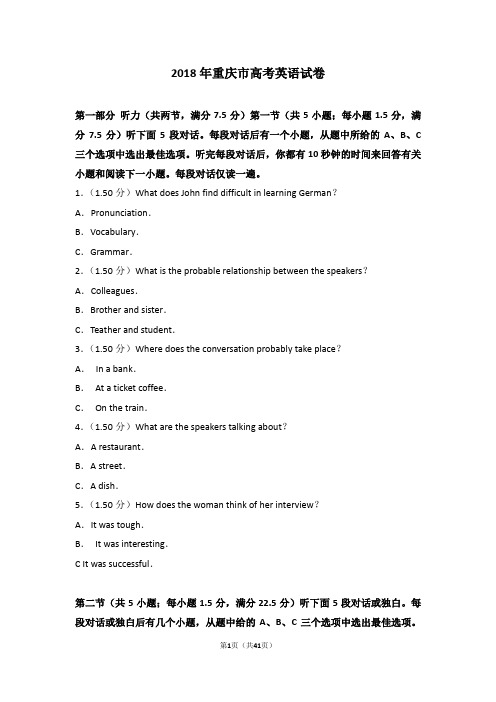
2018年重庆市高考英语试卷第一部分听力(共两节,满分7.5分)第一节(共5小题;每小题1.5分,满分7.5分)听下面5段对话。
每段对话后有一个小题,从题中所给的A、B、C 三个选项中选出最佳选项。
听完每段对话后,你都有10秒钟的时间来回答有关小题和阅读下一小题。
每段对话仅读一遍。
1.(1.50分)What does John find difficult in learning German?A.Pronunciation.B.Vocabulary.C.Grammar.2.(1.50分)What is the probable relationship between the speakers?A.Colleagues.B.Brother and sister.C.Teather and student.3.(1.50分)Where does the conversation probably take place?A.In a bank.B.At a ticket coffee.C.On the train.4.(1.50分)What are the speakers talking about?A.A restaurant.B.A street.C.A dish.5.(1.50分)How does the woman think of her interview?A.It was tough.B.It was interesting.C It was successful.第二节(共5小题;每小题1.5分,满分22.5分)听下面5段对话或独白。
每段对话或独白后有几个小题,从题中给的A、B、C三个选项中选出最佳选项。
听完每段对话或独白前,你将有时间阅读各个小题,每小题5秒钟;听完后,各小题将给出5秒钟的作答时间。
每段对话或独白读两遍。
6.(3.00分)听第6段材料,回答下列各题.(1)When will Judy go to a party?A.On Monday.B.On Tuesday.C.On Wednesday.(2)What will Max do next?A.Fly a kite.B.Read a magazine.C.Do his homework.7.(3.00分)听第7段材料,回答下列各题.(1)What does the man suggest doing at first?A.Going to a concert.B.Watching a movie.C.Playing a computer game.(2)What do the speakers decide to do?A.Visit Mike.B.Go boating.C.Talk a walk.8.(4.50分)听第8段材料,回答下列各题.(1)Which color do cats see better than humans?A.Red.B.Green.C.Blue.(2)Why do cats bring dead birds home?A.To eat them in a safe place.B.To show off their hunting skills.C.To make their owners happy.(3)How does the man sound at the end of the conversation?A.Grateful.B.Humorous.C.Curious.9.(6.00分)听第9段材料,回答下列各题.(1)Who is Macy?A.Ed's mother.B.Ed's teacher.C.Ed's friend.(2)How does Ed usually go to kindergarten?A.By car.B.On foot.C.By bus.(3)What does Ed enjoy doing at the kindergarten?A.Telling stories.B.Singing songs.C.Playing with others.(4)What do the teachers say about Ed?A.He's clever.B.He's quiet.C.He's brave.10.(6.00分)听第10段材料,回答下列各题.(1)At what age did Emily start learning ballet?A.Five.B.Six.C.Nine.(2)Why did Emily move to Toronto?A.To work for a dance school.B.To perform at a dance teacher.C.To learn contemporary dance.(3)Why did Emily quit dancing?A.She was too old to dance.B.She failed to get a scholarship.C.She lost interest in it.(4)How does Emily feel about stopping training?A.She's pleased.B.She's regretful.C.She's upset.第二部分阅读理解(共两节,满分30分)第一节(共4小题;每小题6分,满分30分)阅读下列短文,从每题所给的A、B、C和D四个选项中,选出最佳选项。
【热门】2018年重庆市高考英语试卷

2018年重庆市高考英语试卷第一部分听力(共两节,满分7.5分)第一节(共5小题;每小题1.5分,满分7.5分)听下面5段对话。
每段对话后有一个小题,从题中所给的A、B、C 三个选项中选出最佳选项。
听完每段对话后,你都有10秒钟的时间来回答有关小题和阅读下一小题。
每段对话仅读一遍。
1.(1.50分)What does John find difficult in learning German?A.Pronunciation.B.Vocabulary.C.Grammar.2.(1.50分)What is the probable relationship between the speakers?A.Colleagues.B.Brother and sister.C.Teather and student.3.(1.50分)Where does the conversation probably take place?A.In a bank.B.At a ticket coffee.C.On the train.4.(1.50分)What are the speakers talking about?A.A restaurant.B.A street.C.A dish.5.(1.50分)How does the woman think of her interview?A.It was tough.B.It was interesting.C It was successful.第二节(共5小题;每小题1.5分,满分22.5分)听下面5段对话或独白。
每段对话或独白后有几个小题,从题中给的A、B、C三个选项中选出最佳选项。
听完每段对话或独白前,你将有时间阅读各个小题,每小题5秒钟;听完后,各小题将给出5秒钟的作答时间。
每段对话或独白读两遍。
6.(3.00分)听第6段材料,回答下列各题.(1)When will Judy go to a party?A.On Monday.B.On Tuesday.C.On Wednesday.(2)What will Max do next?A.Fly a kite.B.Read a magazine.C.Do his homework.7.(3.00分)听第7段材料,回答下列各题.(1)What does the man suggest doing at first?A.Going to a concert.B.Watching a movie.C.Playing a computer game.(2)What do the speakers decide to do?A.Visit Mike.B.Go boating.C.Talk a walk.8.(4.50分)听第8段材料,回答下列各题.(1)Which color do cats see better than humans?A.Red.B.Green.C.Blue.(2)Why do cats bring dead birds home?A.To eat them in a safe place.B.To show off their hunting skills.C.To make their owners happy.(3)How does the man sound at the end of the conversation?A.Grateful.B.Humorous.C.Curious.9.(6.00分)听第9段材料,回答下列各题.(1)Who is Macy?A.Ed's mother.B.Ed's teacher.C.Ed's friend.(2)How does Ed usually go to kindergarten?A.By car.B.On foot.C.By bus.(3)What does Ed enjoy doing at the kindergarten?A.Telling stories.B.Singing songs.C.Playing with others.(4)What do the teachers say about Ed?A.He's clever.B.He's quiet.C.He's brave.10.(6.00分)听第10段材料,回答下列各题.(1)At what age did Emily start learning ballet?A.Five.B.Six.C.Nine.(2)Why did Emily move to Toronto?A.To work for a dance school.B.To perform at a dance teacher.C.To learn contemporary dance.(3)Why did Emily quit dancing?A.She was too old to dance.B.She failed to get a scholarship.C.She lost interest in it.(4)How does Emily feel about stopping training?A.She's pleased.B.She's regretful.C.She's upset.第二部分阅读理解(共两节,满分30分)第一节(共4小题;每小题6分,满分30分)阅读下列短文,从每题所给的A、B、C和D四个选项中,选出最佳选项。
2018年重庆英语高考试题及答案(word版)
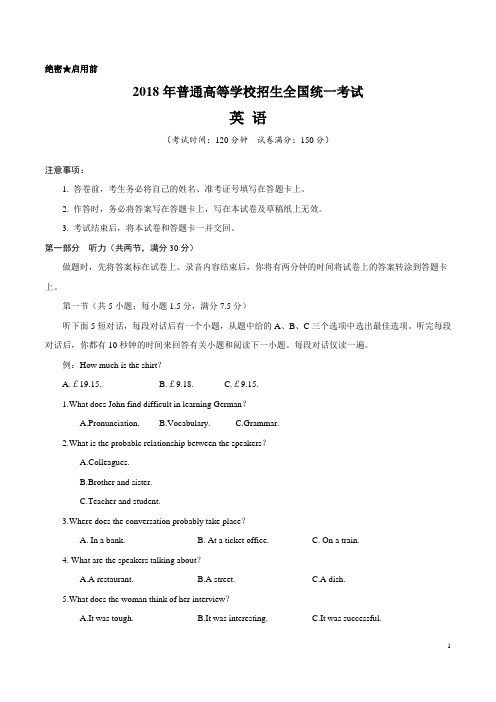
绝密★启用前2018年普通高等学校招生全国统一考试英语(考试时间:120分钟试卷满分:150分)注意事项:1. 答卷前,考生务必将自己的姓名、准考证号填写在答题卡上。
2. 作答时,务必将答案写在答题卡上,写在本试卷及草稿纸上无效。
3. 考试结束后,将本试卷和答题卡一并交回。
第一部分听力(共两节,满分30分)做题时,先将答案标在试卷上。
录音内容结束后,你将有两分钟的时间将试卷上的答案转涂到答题卡上。
第一节(共5小题;每小题1.5分,满分7.5分)听下面5短对话,每段对话后有一个小题,从题中给的A、B、C三个选项中选出最佳选项。
听完每段对话后,你都有10秒钟的时间来回答有关小题和阅读下一小题。
每段对话仅读一遍。
例:How much is the shirt?A.£19.15.B.£9.18.C.£9.15.1.What does John find difficult in learning German?A.Pronunciation.B.Vocabulary.C.Grammar.2.What is the probable relationship between the speakers?A.Colleagues.B.Brother and sister.C.Teacher and student.3.Where does the conversation probably take place?A. In a bank.B. At a ticket office.C. On a train.4. What are the speakers talking about?A.A restaurant.B.A street.C.A dish.5.What does the woman think of her interview?A.It was tough.B.It was interesting.C.It was successful.第二节(共15小题;每小题1.5分,满分22.5分)听下面5段对话或独白,每段对话或独白后有几个小题,从题中所给的A、B、C三个选项中选出最佳选项。
2018年重庆市高考英语试卷【备战高考】
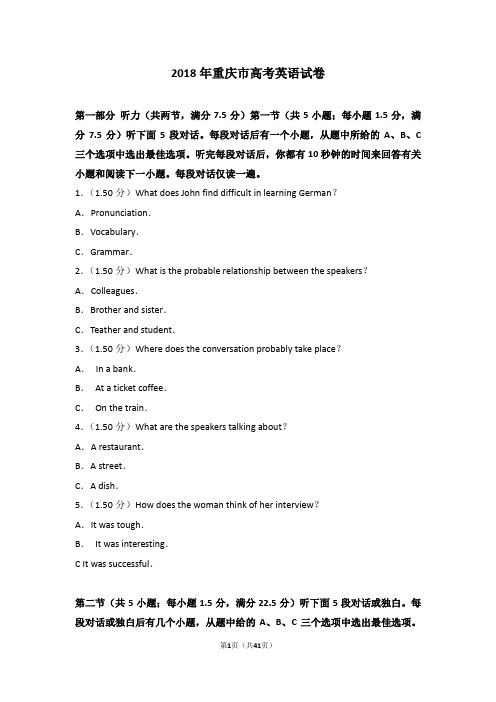
2018年重庆市高考英语试卷第一部分听力(共两节,满分7.5分)第一节(共5小题;每小题1.5分,满分7.5分)听下面5段对话。
每段对话后有一个小题,从题中所给的A、B、C 三个选项中选出最佳选项。
听完每段对话后,你都有10秒钟的时间来回答有关小题和阅读下一小题。
每段对话仅读一遍。
1.(1.50分)What does John find difficult in learning German?A.Pronunciation.B.Vocabulary.C.Grammar.2.(1.50分)What is the probable relationship between the speakers?A.Colleagues.B.Brother and sister.C.Teather and student.3.(1.50分)Where does the conversation probably take place?A.In a bank.B.At a ticket coffee.C.On the train.4.(1.50分)What are the speakers talking about?A.A restaurant.B.A street.C.A dish.5.(1.50分)How does the woman think of her interview?A.It was tough.B.It was interesting.C It was successful.第二节(共5小题;每小题1.5分,满分22.5分)听下面5段对话或独白。
每段对话或独白后有几个小题,从题中给的A、B、C三个选项中选出最佳选项。
听完每段对话或独白前,你将有时间阅读各个小题,每小题5秒钟;听完后,各小题将给出5秒钟的作答时间。
每段对话或独白读两遍。
6.(3.00分)听第6段材料,回答下列各题.(1)When will Judy go to a party?A.On Monday.B.On Tuesday.C.On Wednesday.(2)What will Max do next?A.Fly a kite.B.Read a magazine.C.Do his homework.7.(3.00分)听第7段材料,回答下列各题.(1)What does the man suggest doing at first?A.Going to a concert.B.Watching a movie.C.Playing a computer game.(2)What do the speakers decide to do?A.Visit Mike.B.Go boating.C.Talk a walk.8.(4.50分)听第8段材料,回答下列各题.(1)Which color do cats see better than humans?A.Red.B.Green.C.Blue.(2)Why do cats bring dead birds home?A.To eat them in a safe place.B.To show off their hunting skills.C.To make their owners happy.(3)How does the man sound at the end of the conversation?A.Grateful.B.Humorous.C.Curious.9.(6.00分)听第9段材料,回答下列各题.(1)Who is Macy?A.Ed's mother.B.Ed's teacher.C.Ed's friend.(2)How does Ed usually go to kindergarten?A.By car.B.On foot.C.By bus.(3)What does Ed enjoy doing at the kindergarten?A.Telling stories.B.Singing songs.C.Playing with others.(4)What do the teachers say about Ed?A.He's clever.B.He's quiet.C.He's brave.10.(6.00分)听第10段材料,回答下列各题.(1)At what age did Emily start learning ballet?A.Five.B.Six.C.Nine.(2)Why did Emily move to Toronto?A.To work for a dance school.B.To perform at a dance teacher.C.To learn contemporary dance.(3)Why did Emily quit dancing?A.She was too old to dance.B.She failed to get a scholarship.C.She lost interest in it.(4)How does Emily feel about stopping training?A.She's pleased.B.She's regretful.C.She's upset.第二部分阅读理解(共两节,满分30分)第一节(共4小题;每小题6分,满分30分)阅读下列短文,从每题所给的A、B、C和D四个选项中,选出最佳选项。
2018年重庆市高考英语试卷【推荐】
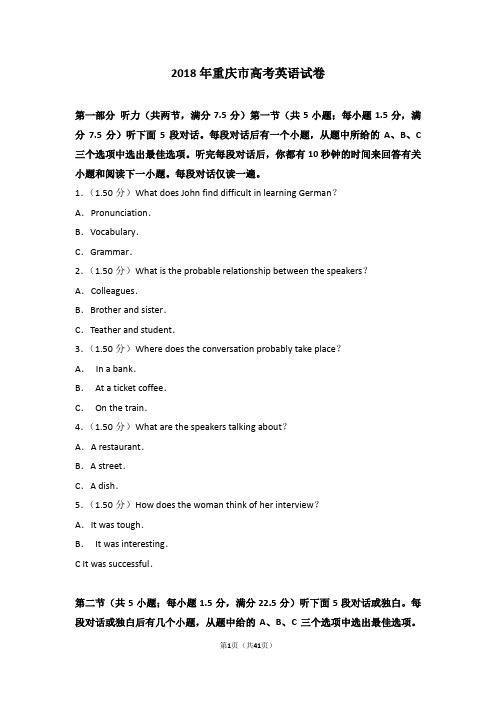
2018年重庆市高考英语试卷第一部分听力(共两节,满分7.5分)第一节(共5小题;每小题1.5分,满分7.5分)听下面5段对话。
每段对话后有一个小题,从题中所给的A、B、C 三个选项中选出最佳选项。
听完每段对话后,你都有10秒钟的时间来回答有关小题和阅读下一小题。
每段对话仅读一遍。
1.(1.50分)What does John find difficult in learning German?A.Pronunciation.B.Vocabulary.C.Grammar.2.(1.50分)What is the probable relationship between the speakers?A.Colleagues.B.Brother and sister.C.Teather and student.3.(1.50分)Where does the conversation probably take place?A.In a bank.B.At a ticket coffee.C.On the train.4.(1.50分)What are the speakers talking about?A.A restaurant.B.A street.C.A dish.5.(1.50分)How does the woman think of her interview?A.It was tough.B.It was interesting.C It was successful.第二节(共5小题;每小题1.5分,满分22.5分)听下面5段对话或独白。
每段对话或独白后有几个小题,从题中给的A、B、C三个选项中选出最佳选项。
听完每段对话或独白前,你将有时间阅读各个小题,每小题5秒钟;听完后,各小题将给出5秒钟的作答时间。
每段对话或独白读两遍。
6.(3.00分)听第6段材料,回答下列各题.(1)When will Judy go to a party?A.On Monday.B.On Tuesday.C.On Wednesday.(2)What will Max do next?A.Fly a kite.B.Read a magazine.C.Do his homework.7.(3.00分)听第7段材料,回答下列各题.(1)What does the man suggest doing at first?A.Going to a concert.B.Watching a movie.C.Playing a computer game.(2)What do the speakers decide to do?A.Visit Mike.B.Go boating.C.Talk a walk.8.(4.50分)听第8段材料,回答下列各题.(1)Which color do cats see better than humans?A.Red.B.Green.C.Blue.(2)Why do cats bring dead birds home?A.To eat them in a safe place.B.To show off their hunting skills.C.To make their owners happy.(3)How does the man sound at the end of the conversation?A.Grateful.B.Humorous.C.Curious.9.(6.00分)听第9段材料,回答下列各题.(1)Who is Macy?A.Ed's mother.B.Ed's teacher.C.Ed's friend.(2)How does Ed usually go to kindergarten?A.By car.B.On foot.C.By bus.(3)What does Ed enjoy doing at the kindergarten?A.Telling stories.B.Singing songs.C.Playing with others.(4)What do the teachers say about Ed?A.He's clever.B.He's quiet.C.He's brave.10.(6.00分)听第10段材料,回答下列各题.(1)At what age did Emily start learning ballet?A.Five.B.Six.C.Nine.(2)Why did Emily move to Toronto?A.To work for a dance school.B.To perform at a dance teacher.C.To learn contemporary dance.(3)Why did Emily quit dancing?A.She was too old to dance.B.She failed to get a scholarship.C.She lost interest in it.(4)How does Emily feel about stopping training?A.She's pleased.B.She's regretful.C.She's upset.第二部分阅读理解(共两节,满分30分)第一节(共4小题;每小题6分,满分30分)阅读下列短文,从每题所给的A、B、C和D四个选项中,选出最佳选项。
- 1、下载文档前请自行甄别文档内容的完整性,平台不提供额外的编辑、内容补充、找答案等附加服务。
- 2、"仅部分预览"的文档,不可在线预览部分如存在完整性等问题,可反馈申请退款(可完整预览的文档不适用该条件!)。
- 3、如文档侵犯您的权益,请联系客服反馈,我们会尽快为您处理(人工客服工作时间:9:00-18:30)。
绝密★启用前解密时间:2014年6月8日16:40 【考试时间:6月8日15:00-16:40】2014年普通高等学校招生全国统一考试(重庆卷)英语试题卷英语试题卷共10页。
满分120分。
考试时间l00分钟。
注意事项:I.答题前,务必将自己的姓名、准考证号填写在答题卡规定的位置上。
2.答选择题时,必须使用2B铅笔将答题卡上对应题目的答案标号涂黑。
如需改动,用橡皮擦擦干净后,再选涂其它答案标号。
3.答非选择题时,必须使用0.5毫米黑色签字笔,将答案书写在答题卡规定的位置上。
4.所有题目必须在答题卡上作答,在试题卷上答题无效。
5.考试结束后,将试题卷和答题卡一并交回。
一、单项填空(共15小题;每小题1分,满分15分)请从A、B、C、D四个选项中,选出可以填人空白处的最佳选项,井在答题卡上将该选项的标号涂黑。
例: A computer can only do_______________ you have instructed it to do.A. howB. afterC. whatD. when答案是C。
1. A smile costs ___________________, but gives much.A. anythingB. somethingC. nothingD. everything2. --- Why not stay here a little longer?--- ______________________, but I really have to go.A. Never mindB. I’d love toC. Pleased to meet youD. I can’t find any reason3. I’ve ordered some pizza, so we _____________ worry about cooking when we get home tired.A. can’tB. dare notC. needn’tD. may not4. You’d better write down her phone number before you __________________ it.A. forgetB. are forgettingC. forgotD. will forget5. The producer comes regularly to collect the cameras_____________ to our shop for quality problems.A. returningB. returnedC. to returnD. to be returned6. I can’t tell you_______ way to the Wilson’s because we don’t have________ Wilson here in the village.A. the; aB. a; /C. a: theD. the; /7. She drove so fast at the turn that the car almost went _____________ the road.A. onB. alongC. from,D. off8. James has just arrived, but I didn’t know he __________________ until yesterday.A. will comeB. was comingC. had comeD. came9. We’ll reach the sales targets in a month __________ we set at the beginning of the year.A. whichB. whereC. whenD. what10. --- I spent two weeks in London last summer.--- Then you must have visited the British Museum during your stay, __________ you?A. mustn’tB. haven’tC. didn’tD. hadn’t11. Group activities will be organized after class _______________ children develop team spirit.A. helpingB. having helpedC. helpedD. to help12. --- Is it true that Mike refused an offer from Yale University yesterday?--- Yeah, but I have no idea _____________ he did it; that’s one of his favorite universities.A. whenB. whyC. thatD. haw13. It was John who broke the window. Why are you talking to me as if I______________ it?A. had doneB. have doneC. didD. am doing14. Half an hour later, Lucy still couldn’t get a taxi _______________ the bus had dropped her.A. untilB. whenC. althoughD. where15. --- Jack, I’d like to have your opinions about my written report.--- ___________________ . But I have one suggestion.A. That’s a good ideaB. You are modestC. It looks fine to meD. You should check it first二、完形填空(共20小题;每小题1.5分,满分30分)请阅读下面两篇短文,掌握大意,然后从16—35各题所给的四个选项(A、B、C和D)中,选出最佳选项,并在答题卡上将该选项的标号涂黑。
AFive months after my husband Steve died, I woke up one morning to the maddening sound of a leaking faucet (水龙头). I knew it needed repairs badly, but it 16 me so much just to think of it.All our 17 life, I was the “artist,” bringing to our house much imagination. Steve was the “18 ”one. He had a real gift for handling chores (家务活), 19 me from unpleasant repair jobs.But how could such a good man have his life cut short so suddenly ! I had been so sad and angry that I completely 20 the house. That leaky faucet somehow awakened me to the fact that I now had to 21the challenge of getting things fixed.I got a workman named Ahmed. Entering the house, he stopped before a picture of Steve and me. “Doesn’t your husband 22 this kind of work?” he asked. “It's not hard.”“ He died months ago. When he was alive, he did all the repair jobs 23 ,”I said quietly.Ahmed looked at me 24 , but didn’t reply. He fixed the faucet, adjusted the dishwasher door, and replaced a showerhead. Apparently he was gifted as Steve had been.He did a(n) 25 job. I asked him to name his fee. “ No charge, Ma'am,” he said. “ My father died early, and the neighbors helped my family through.”By fixing a faucet, Ahmed mended my soul. Although I would sure carry the pain of 26 with me along, Ahmed reminded me of the abundant 27 in the world.16. A. hurt B. puzzled C. cost D. disappointed17. A. separate B. shared C. spiritual D. social18. A. active B. baring C. careless D. practical19. A. attracting B. sheltering C. driving D. prohibiting20. A. ignored B. hated C. cleaned D. missed21. A. come up with B. face up to C. look forward to D. step away from22. A. begin B. check C. like D. find23. A. gratefully B. firmly C. bravely D. wonderfully24. A. strangely B. innocently C. painfully D. sympathetically25. A. terrible B. excellent C. important D. dangerous26. A. loss B. failure C. fear D. regret27. A. friendship B. devotion C. kindness D. justiceBCultural differences occur wherever you go. When visiting another country you should be aware of those differences and 28 them. Here are some 29 on how to fit in.Every traveler to a foreign country feels 30 at some point. What you do can make locals laugh. Your best defense is a sense of 31 . If you can laugh off eating with the wrong hand in India, locals will warm to you as “ that crazy foreigner.”Wearing proper clothes is important too, 32 locals will judge you by what you wear. In some Middle Eastern countries, exposing your flesh is 33 , especially if you are a woman. So leave your torn jeans at home.Also be cautious about expressing 34 . Getting angry in Southeast Asia just makes you look silly. In some countries it is 35 to kiss in public.28. A. reject B. recite C. respect D. remove.29. A. plans B. tips C. arguments D. choices30. A. unsafe B. excited C. satisfied D. awkward3l. A. relief B. belonging C. humor D. direction32. A. but B. for C.so D. or33. A. forbidden B. allowed C. expected D. tolerated34. A. emotions B. concern C. interest D. views35. A. natural B. advisable C. unwise D. unnecessary三、阅读理解(共20小题;每小题2分,满分40分)请阅读下列短文,从每题所给的四个选项(A、B、c和D)中,选出最佳选项,并在答题卡上将该选项的标号涂黑。
